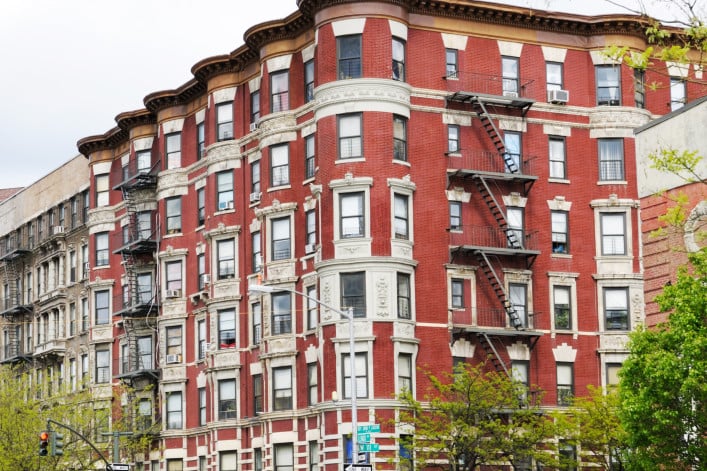A landlord won't accept my housing voucher. What can I do?
- You can report discrimination claims to the State Division on Human Rights and the NYC Commission on Human Rights
- You can also get a friend to go to the apartment for you and get an application, then you can apply
- After your application is in you are better positioned to assert your rights as a voucher holder

If you believe you have been ghosted by the landlord because you have a voucher, you can contact the broker and say you want a chance to apply for the apartment.
Lisa-Blue/iStock/Getty Images Plus via Getty Images
A landlord won't accept my housing voucher to rent an apartment. What can I do?
It is illegal to deny an apartment to a renter who uses a housing voucher or subsidy to pay the rent. Unfortunately, this practice—known as source of income discrimination still occurs, our experts say. Currently 88 real estate companies are facing a lawsuit—they're being accused of illegal discrimination against individuals posing as Section 8 voucher holders in an investigation by the Housing Rights Initiative.
There are thousands of renters currently looking for apartments with vouchers, says Stephanie R. Rudolph, an attorney at the Legal Aid Society. Without a housing voucher, you need to meet a landlord's income requirements—typically you need an income of 40 times the rent. However, there's no minimum income requirement for voucher holders.
If a landlord isn’t accepting your housing voucher, the priority is to find safe housing with the use of your voucher. There are also avenues to pursue your rights and seek accountability.
Know the maximum rent for the voucher program
The first piece of advice is to look for an apartment with a rent that will be approved by the administering government agency. “What that maximum rent is depends on the voucher program and sometimes the zip code in which the apartment is located,” Rudolph says.
That means if you are looking in Manhattan, you might qualify for a studio with a rent of $3,500 in certain zip codes like Midtown and the East Village but in the Bronx it might be $2,300. In addition, Section 8 is administered by three or four different agencies so depending on your agency you may have a different ability to pay a certain rent, Rudolph says.
It’s important to look for apartments within or below your payment standard—this is the maximum amount of subsidy the government agency will pay for an apartment of a certain size. The payment standard includes all utilities. Some listings don’t say what utilities are included.
“You don’t want to be surprised that none of the utilities are included and you have to rent $200 below the payment standard,” Rudolph says.
Tips for finding affordable housing with vouchers
You may be more likely to find an apartment within your payment standard if it is rent-stabilized. Rent-stabilized apartments exist to make sure the city has an inventory of affordable housing. These apartments also come with the added protections of automatic lease renewals and capped rent-increases.
You can search the Division of Housing and Community Renewal by zip code to get a list of buildings with rent-stabilized apartments in a particular neighborhood. This can tell you which buildings to hone in on when searching. Some apartments have been cycled out of the stabilization program, so not all apartments in a building will be stabilized. Another resource is Who Owns What in NYC, which can help you identify buildings with rent-stabilized apartments.
An alternative route to finding a rent-stabilized apartment is to apply via the city’s affordable housing lottery. This takes some persistence and there are certain eligibility requirement but with luck, it’s possible you can land a modern apartment in a brand new building.
The benefits of renting from larger landlords
All landlords must follow the law, regardless of the building size. If you are illegally rejected and want to assert your rights, you will have a better chance in a larger building with lots of apartments.
In a smaller building, by the time you get a chance to voice your concerns about the treatment you've received, it’s likely the apartment will be rented out to someone else. Such is the speed of the NYC rental market. Larger landlords will have more apartments and may be able to offer you an alternative, even if the original apartment has been leased.
“A larger landlord is likely to have another unit that’s available,” Rudolph says.
The importance of avoiding buildings with violations
For Section 8 and other programs there is an inspection process to assess the condition of the apartment you want to lease. Once you find an apartment, it needs to be inspected to make sure it meets specific codes.
Check whether there are building complaints via Who Owns What in NYC. If there are lots of complaints and violations it could be a red flag. “You could get the apartment and then it might not pass inspection,” Rudolph says.
How to protect yourself from housing discrimination
You cannot lie and say you are not part of a program if you are getting assistance. However, when you are searching for apartments, you don’t have to volunteer your status as a voucher holder. “Disclose you have a voucher when asked, obviously put it on the application, but try to get in the door to view the apartment and if they don’t ask, don’t volunteer,” Rudolph says.
After your application is in, you are better positioned to assert your rights.
If you are being ghosted by a landlord, Rudolph says some of their clients will search alongside a friend or will use Google Voice (providing them with a different phone number) to enquire about the apartment as a person who makes 40 times the rent. This way, you can see whether the broker responds to someone else after you—the voucher holder—have been ignored.
“Some of the state and city agencies do testing like that to see if brokers and landlords are following the law,” Rudolph says. The city recently announced a $3.1 million effort over four years to conduct testing and enforce anti-discrimination laws for people needing rental assistance.
How to assert your rights as a voucher holder
If you believe you have been discriminated against and are being ghosted because you have a voucher you can contact the broker and say you want a chance to apply to the apartment. “That can be completely ineffective or occasionally effective,” Rudolph says.
You can also report the broker to the NYS Department of State, the agency that oversees broker licensing. This holds some clout because it will affect a broker's livelihood.
You can get a friend to go to the apartment for you and get an application, then you can apply. It’s worth recording all your conversations. Under New York law you can record telephone or in-person conversations if at least one party consents. You can also screenshot ads so you have a record of the apartments you apply for.
You can report discrimination claims to the State Division on Human Rights and the NYC Commission on Human Rights.
If you are dealing with a big brokerage with a legal department, Rudolph says they will often put in a call to them, skirting the broker. It’s possible the broker may be inexperienced and not know how to deal with vouchers in an application.
Rudolph recommends telling the legal team you are an applicant and you’ve been ignored and you want an opportunity to apply to the apartment. (If you have evidence that someone else who makes an income of 40 times the rent is being allowed to apply but you are not, you can cite this).
Starting legal action is another option but it’s difficult without a lawyer and by the time you’ve started the lawsuit the apartment will often be rented to someone else. With legal help, you may be able to bring a temporary restraining order. “If I think I can do it fast enough I will go to court and ask them to hold the unit for my client,” Rudolph says.
Staying in an apartment with a voucher
There are lots of reasons why you might receive a voucher while you are tenant. A change in circumstances or a major life event can lead to your rent exceeding your wages so a housing voucher can be a lifeline. In these circumstances, your landlord must fill out the relevant paperwork and then have the apartment pass an inspection.
If you've been in place a long time, sometimes the landlord has neglected the apartment. "Section 8 cannot operate if the apartment is not habitable," Rudolph says. In order for the apartment to pass the inspection, repairs might include lead remediation, fixing floor tiles, or painting the apartment.
If you are facing eviction for non-payment alone, it can be a very emotional period. However, if it's a non-payment case and you have a housing voucher, your landlord will have little choice but to fill out the paperwork.
You Might Also Like



























